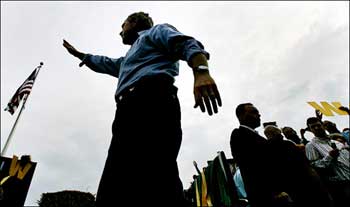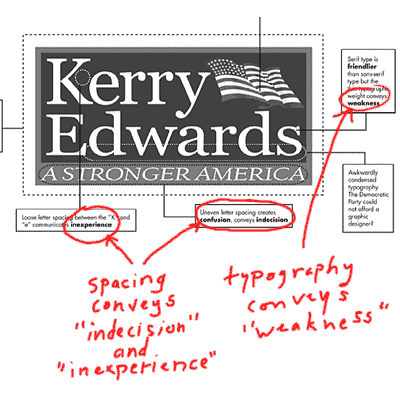Notes
In Which The NYTimes Public Editor Has A Meltdown, And We Consider Whether BAGnewsNotes Caused Him To Lose It

In my previous post, I described how my Guest Blogger, Karen, complained to the NYTimes about their photo coverage of George Bush and John Kerry.
This morning, we got his reply, and all I can say is “ouch!”
First of all, I can’t claim credit for any of Mr. Okrent’s comments about complaints he’s received about articles. He does say, however, that he got two complaints about photo coverage. Given the message my Guest Blogger received, I’m assuming she was one of them. If that’s true, I wanted to respond specifically to several of the points/charges Mr. Okrent makes in his article. (Full text here.)
1.) First of all, the headline: “How Would Jackson Pollock Cover This Campaign?”
Besides the sarcasm, what’s the point? Are you saying that it’s not fair game to read into a picture? Are you saying that the interpretation of images is so imprecise as to absolve the Times from any bias? I think it’s a cheap move to hide behind the point that photographs are some kind of abstract expression.
2.) Mr. Okrent writes: “A Bush-hater will see a front-page picture of the confident president greeting enthusiastic crowds and shout “Bias!” much more quickly than he will remember the nearly identical photo of Kerry that ran the day before.”
I’m not saying that the political slant in the photo coverage doesn’t go both ways. Of course it does. But that fact doesn’t mean that there isn’t a regular and systematic pattern of coverage that casts Mr. Kerry in a particular context in comparison to President Bush. What is more disturbing than anything else is that fact that Mr. Okrent refuses to cop to this possibility. What he also doesn’t address is the extent to which the Times, and other big media, have been complicit with the Administration’s spin. The paper recently took the step of admitting they were pacified by the administration on Iraq. Why wouldn’t it follow that their photo coverage could be similarly colored by the Administration’s propaganda/intimidation campaign?
3.) Mr. Okrent writes: “If there’s a commissariat at The Times ordering up coverage to help or hurt a specific candidate, it’s doing a lousy job.”
Who’s talking about a conspiracy, or even a conscious effort at bias? I happen to think that the depiction of Bush as strong, and Kerry as weak (or indecisive, or isolated) is more unconscious than anything else. To the extent these perceptions have been skillfully executed by the Administration in the same way the advertising industry imparts messages (through a combination of overt repetition and surreptitious subliminal techniques), I would hope the Times would be that much more vigilant to guard against their perpetuation.
4. ) Mr. Okrent writes: “Conservatives thought Cheney won the vice-presidential debate; liberals thought Edwards did. I can look at pictures of my children and see that they are flawless; you will see them differently (even though they are, of course, flawless).” He then goes on to say: Unquestionably, individual articles, headlines or photographs do cast one or another candidate in a colored light, either rosy or dark.
In one paragraph, he’s emphasizing the point that pictures are entirely subjective. In the next paragraph, he makes the argument that bias is natural, and it all balances out (“…bruises administered to each…”). Which is it?
5.) Mr. Okrent writes: “Show me an interesting photograph, and I’ll show you an opinion. (I can’t wait to hear what readers think of the Kerry portrait today on the cover The New York Times Magazine, much less the article itself.) (Check that: Yes, I can.)”
Me thinks he doth protest too much! Citing the photograph of John Kerry on the cover of the NYTimes Magazine completely misses the point. As an accompaniment to an opinion piece, that image is irrelevant to this argument. The issue I’m talking about is the tendency to present systematic bias, or to reinforce biased characterizations, through supposedly (more) objective news photos.
6.) Mr. Okrent writes: “I … don’t wish to discourage readers who in good faith find errors, misrepresentations or unfair characterizations. They may occur randomly, but their frequency is disappointing, and I’ll continue to forward meritorious complaints to the appropriate editors and reporters. Many will find expression in the corrections column, or in this one.”
I’m happy to hear this. If my guest blogger’s tone or level of frustration detracted from the point she was making, I hope that this commentary; the examples I’ve presented in previous posts (linked above); as well as the examples that follow this post, might be considered a more reasoned challenge/critique.. I will email Mr. Okrent and the Times tomorrow with a link to these entries, and ask for a response to the issues I’ve raised.
7.) Mr. Okrent ends his article by citing a threatening letter recently sent to Times correspondent Adam Nagourney. Besides the questionable practice of naming the writer and calling him a coward, Mr. Okrent goes on a rant about how much flack the Times has received from the left-wing lately, especially from the blogosphere. I won’t repeat his comments because I believe he probably would rather have them back.
I just have these comments in reply: a.) Be careful about painting all blogs with one brush. b.) The rule we live by in the blogosphere is this: expect everything you say to be scrutinized; be ready to defend what is justifiable; be prepared to capitulate on what’s not. If you can’t get past your pretensions, you can’t advance the discourse. And that, ultimately, is what the blogosphere is about. c.) The days of the “free pass” from the left wing are over. So are the days of a (more) passive readership. Get used to it. d.) The other thing that you get used to pretty quickly in the blogosphere are comments and communications that are hateful and hurtful. I get plenty of this crap. It was harder to take when I first started blogging. These days, I ignore most of it. However, it’s still hard to digest stinging attacks that are on the borderline of propriety. I think Mr. Okrent has no choice but to get a thicker skin. It’s just part of the price of a more open and participatory journalism — Ivory Tower, not withstanding.


Reactions
Comments Powered by Disqus